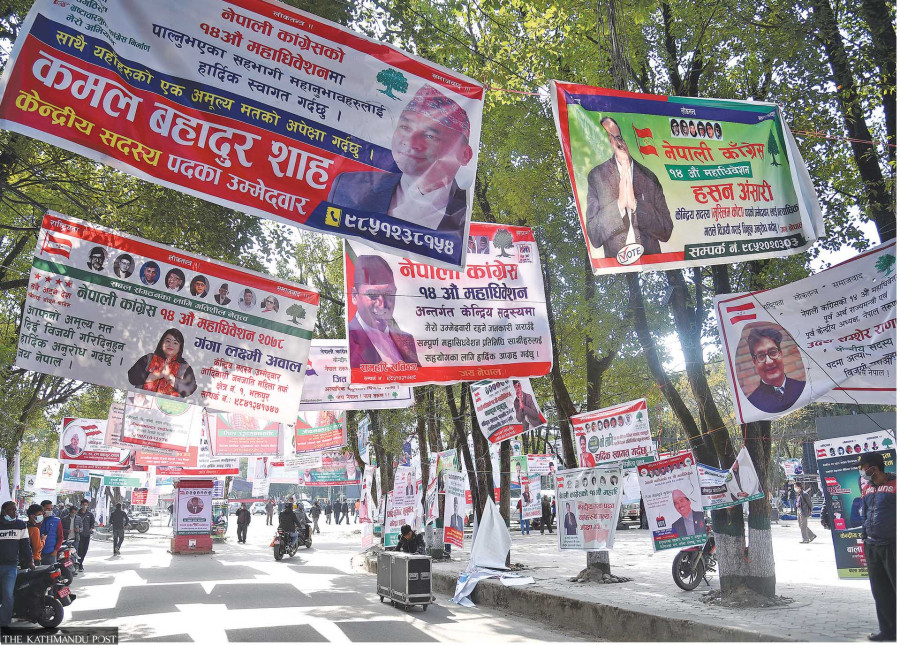Money
FNCCI preparing business code of conduct to end unfair practices
The move comes ahead of two crucial elections slated for next year when donation drives and extortion by political parties are expected to accelerate.
Krishana Prasain
The Federation of Nepalese Chambers of Commerce and Industry (FNCCI) is preparing a comprehensive business code of conduct as growing unfair and irresponsible practices have been hurting the corporate and business environment, the country’s apex private sector body said on Friday.
The FNCCI has started collecting views from stakeholders as an input for the protocol for its members.
The move comes ahead of two crucial elections slated for next year when donation drives and extortion by political parties are expected to accelerate as they raise money to fund their campaigns.
Industry insiders say the code of conduct is indirectly meant to control donation drives by the political parties.
Consumers are already bearing the brunt of rising prices which shows election preparations have started, consumer rights activists say.
The general convention season is on with major political parties holding mass gatherings of their members which has led to price increases in the market.
These jamborees are held with funding by industrial entrepreneurs and traders, and they have passed on their expenses to the Nepali consumer, Madhav Timalsina, president of the Consumer Rights Investigation Forum, told the Post on Thursday.
The Gandaki Election Committee of the Nepali Congress has set the registration fee for a candidate for the provincial committee chair at a whopping Rs91,000 during the voting held last week in preparation for the ruling party’s general convention that kicked off in Kathmandu on Friday.
The main opposition CPN-UML also conducted its 10th general convention in Sauraha, Chitwan last month, bringing together tens of thousands of its supporters.
The recent conventions of the parties suggest that the increasing cost of engaging in internal politics could make national politics highly expensive.
A study carried out by the Election Observation Committee, Nepal showed that the government, political parties and candidates spent an estimated Rs131.63 billion in total during the 2017 elections.
“And the costs of campaigning are taken out of the consumer's pocket by hiking the prices of goods and services,” Timalsina said.
At the same time, traders are having a free hand in setting market prices because the Ministry of Industry, Commerce and Supply has been headless for more than five months now,” Timalsina added.
"Political events and lack of government presence have become a bonanza for traders who are fixing the prices of goods and services on their own," he said.
In 2013, the FNCCI for the first time released codes of conduct dealing with six areas—consumer rights, competitive market, taxation, labour management, environment protection and corruption control.
FNCCI President Shekhar Golchha said the time had come to revise the code of conduct as the private sector aspires to achieve economic prosperity.
“Without dignity, the private sector cannot thrive and will not be able to achieve economic prosperity. To make business dignified, a code of conduct is important,” Golchha said, speaking at a programme jointly organised by the federation and Transparency International Nepal on Friday.
The private sector has introduced a vision paper for economic prosperity that also includes a key feature for a reputable private sector.
The FNCCI is revising the code of conduct under the leadership of Padma Jyoti, a past president of the organisation. Work on drafting the code of conduct has already started, and a Business Code of Conduct Forum has been formed, the federation said.
"The private sector contributes hugely to the country's economy, but its impression among the public is not so good when they look from the profit making perspective," said Golchha.
Participants in the discussion programme said that corruption has thrived and is mostly visible in procurement made by the government involving the private sector too.
“Illegal financial dealings and campaign contributions increase during elections and general conventions, and that needs to be looked into seriously,” said Jyoti. “Corruption is deeply rooted in the country's working culture. Even to have a small task done, we have to pay a bribe.”
Jyoti added, "People have to offer 'tea expenses' to get their normal tasks done. Imagine how big projects will be undertaken. No one considers the rule of law when there is a deal involving money. In Nepal, those who accept bribes are corrupt, but those who offer bribes are not counted as corrupt. The law needs to book the givers too.”
Private sector representatives said that the economic environment was getting polluted and poisonous due to increasing corruption even to have small tasks done which, in the long term, discourages potential investments.
"The private sector is also facing criticism that entrepreneurs are focused more on businesses that bring profits overnight, and are involved in activities looking at short term benefits," said Jyoti.
Nepal ranked in the 117th position among 180 countries with a score of 33 in the Corruption Perceptions Index 2020, a report published by Transparency International. Countries obtaining a score of less that 50 are considered to have corruption.
Mukunda Bahadur Pradhan, general secretary of Transparency International Nepal, said a huge amount of money is spent on election campaigns, and potential candidates engage in financial dealings to get their party's nomination and even to buy votes.
Pradhan added that the revised code of conduct must state that inappropriate payments and benefits should not be given to any government or non-government organisation, association or individual to have a task done.
“The money and gifts provided to anyone needs to be made public, and the organisation also should be pressured to reveal the gifts received,” he said. “But it is difficult to become transparent.”
Pradhan said that the commission or amount given to an agent had become a big problem in a country like Nepal. Transparency International Nepal has suggested making such income taxable.




 9.83°C Kathmandu
9.83°C Kathmandu















